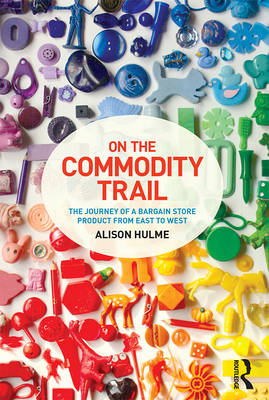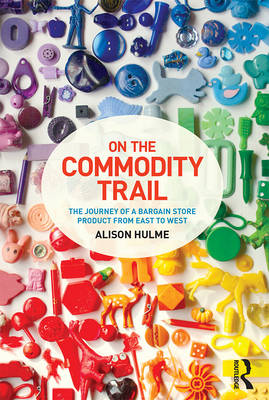
- Afhalen na 1 uur in een winkel met voorraad
- Gratis thuislevering in België vanaf € 30
- Ruim aanbod met 7 miljoen producten
- Afhalen na 1 uur in een winkel met voorraad
- Gratis thuislevering in België vanaf € 30
- Ruim aanbod met 7 miljoen producten
Zoeken
On the Commodity Trail
The Journey of a Bargain Store Product from East to West
Alison Hulme
Paperback | Engels
€ 43,45
+ 86 punten
Uitvoering
Omschrijving
Following the journey of eight bargain store objects, Alison Hulme reveals the complex story behind society's simplest and cheapest commodities. Inspired by Walter Benjamin's Arcades Project, On the Commodity Trail explores the colourful and fascinating histories of everyday objects.Along the way, we observe raw materials on municipal rubbish dumps in China, newly re-made products in the world's largest wholesale market, and take a journey across the seas, to bargain stores in Europe and North America, arriving finally in the homes of consumers. Weaving together narratives from the people we meet at different parts of the commodity chain - waste peddlers, wholesalers, store owners, and shoppers - the book examines the places and people at the heart of these localized yet immense global networks.Unlike other investigations of commodity chains, this study does not chart a straightforward trajectory from production to consumption. Instead, it demonstrates that the low-end commodity chain is one of constant rupture in which products are made and re-made, blurring the dividing line between producing and consuming.An ethnography of material culture as well as an examination of commodity culture at a time of economic downturn, this deeply-engrossing book makes a unique contribution to our understanding of commodity chains and consumer culture.
Specificaties
Betrokkenen
- Auteur(s):
- Uitgeverij:
Inhoud
- Aantal bladzijden:
- 172
- Taal:
- Engels
Eigenschappen
- Productcode (EAN):
- 9781472572851
- Verschijningsdatum:
- 29/04/2020
- Uitvoering:
- Paperback
- Formaat:
- Trade paperback (VS)
- Afmetingen:
- 160 mm x 234 mm
- Gewicht:
- 272 g

Alleen bij Standaard Boekhandel
+ 86 punten op je klantenkaart van Standaard Boekhandel
Beoordelingen
We publiceren alleen reviews die voldoen aan de voorwaarden voor reviews. Bekijk onze voorwaarden voor reviews.











